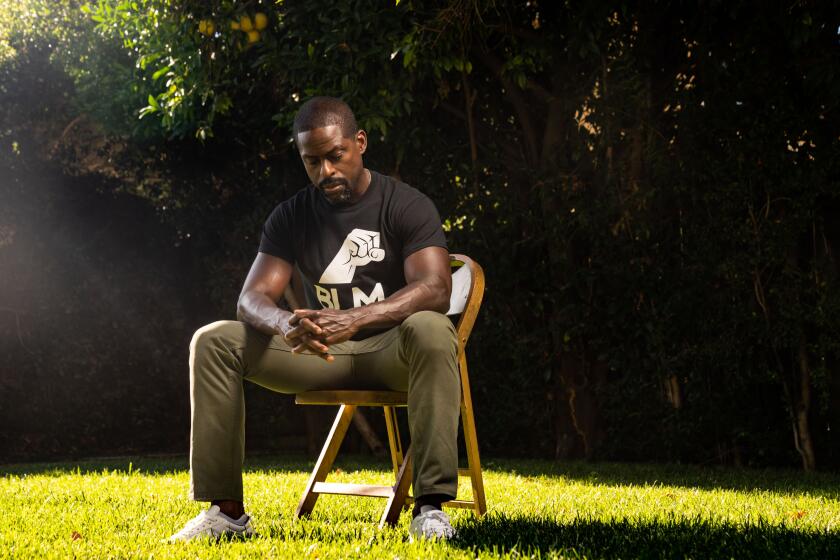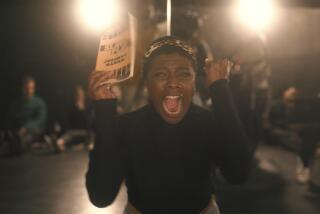Sterling K. Brown proves that casting a straight actor in a gay role isn’t always a misstep
Play readings on Zoom are a pandemic placeholder few theater-lovers will be sad to give up. But they have on occasion provided an opportunity to experiment with casting, shedding fresh light on a role, a performer and even a playwright.
A reading of Larry Kramer’s “The Normal Heart,” a benefit for the ONE Archives Foundation, did just that on Saturday night. Sterling K. Brown and Laverne Cox were the headliners in an ensemble directed by Paris Barclay.
Many were no doubt tuning into see what Cox, the “Orange Is the New Black” star, would do with the role of Dr. Emma Brookner, the pioneering AIDS doctor who sounds the alarm from her motorized wheelchair that a mysterious new disease is cutting a deadly swath through the gay community.
Cox’s exciting presence expanded the play’s LGBTQ reach, but her portrayal of Dr. Brookner was undermined by earnest line readings. In truth, I was ready to click off when something powerfully drew me in: Brown, in the role of Kramer’s surrogate, Ned Weeks, illuminating the contradictions and complexities of a hero who was nothing if not exasperatingly human.
What ticket buyer wants to spend unnecessary time in a crowded lobby or cramped restroom? Even more important: the broken spell of storytelling onstage.
Brown, who’s Black and straight, didn’t try to summon the white and gay Kramer back to life. The accent and mannerisms belonged to a newly interpreted Ned Weeks, a Ned Weeks who neither looked nor sounded like the author who created him.
But what Brown captured so brilliantly, even in the compartmentalized squares of a virtual reading, were the internal forces prodding the character’s conscience into action. Social justice of this magnitude isn’t an abstract phenomenon. Beneath Ned’s moral fury lies a great deal of sorrow, private and public.
Elias Canetti, writing about Franz Kafka, made the observation that though “life’s horror” is never out of sight, “most people notice it only on occasion.” But there are others “whom inner forces appoint to bear witness.”
In tracing Ned’s journey from accidental activist to AIDS crusader, Brown helped us connect the character’s alienation and longing — his brokenness in a homophobic society — to his refusal to look away from communal suffering. Ned’s woundedness drives him to see what others, less adapted to being out of favor, would prefer to ignore.
Cornerstone in L.A. and Oregon Shakespeare Festival pair up with BIPOC artists to launch the Stage Directors and Choreographers Foundation program.
In Brown’s scenes with Jeremy Pope, who touchingly played Felix Turner, a New York Times reporter with whom Ned falls in love, the personal and the political were heartbreakingly joined. Ned’s struggle for intimate connection and commitment became one with his fight to get the world to give a damn about dying gay men.
During the rocky start of a fateful date, Felix asks Ned, “What’s the matter? Don’t you think you’re attractive? Don’t you like your body?” Brown made what seemed like an unconscious gesture, puffing his cheek as though Ned were unsure whether to speak or swallow his shame.
The specificity of the performance, the truthfulness of psychological detail, dissolved the boundaries between past and present. The alchemy of actor and role established an unspoken yet profound connection between the early days of the AIDS epidemic, when the government shrugged at the mass casualties of a stigmatized population, and the COVID-19 pandemic, which has disproportionately taken the lives of Black and brown Americans.
Although one might expect that a benefit reading of “The Normal Heart” for an organization dedicated to preserving LGBTQ cultural history would seek out talent from that community, the choice of Brown was inspired. Not only is he an exceptional, Emmy-winning actor, but his performance represented an act of coalition building, a recognition of shared struggle and a refusal to let the walls of identity serve as a prison.
Without dabbling in lesson-drawing anachronism, Brown’s Ned harmonized the cries of AIDS activists and Black Lives Matter protestors. An acute sense of endangered humanity and a desperate hunger for justice pointed the way.
For Ned, anger is a form of love. Early on, he asks Dr. Brookner whether having a big mouth is a symptom of AIDS. She tells him, “No, a cure.”
Casting that reminds us of the perpetual need for this cure is invaluable. But Brown offered something more: He showed us the mourning under the militancy.
Double Emmy nominee Sterling K. Brown (he was in ‘The Marvelous Mrs. Maisel’ too) teases to upcoming Pearson family tribulations.
More to Read
The biggest entertainment stories
Get our big stories about Hollywood, film, television, music, arts, culture and more right in your inbox as soon as they publish.
You may occasionally receive promotional content from the Los Angeles Times.












